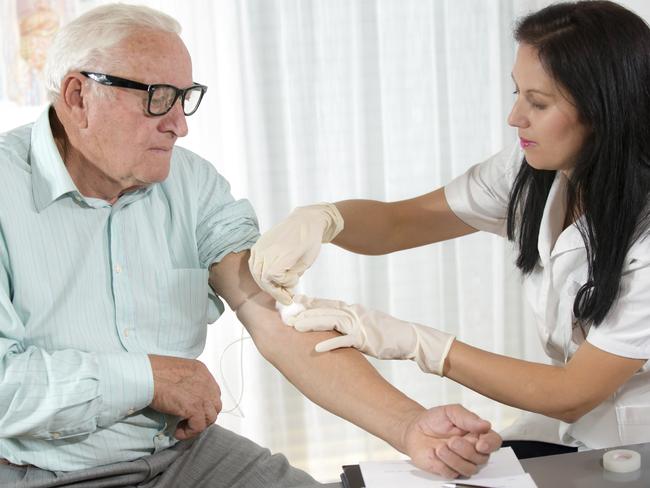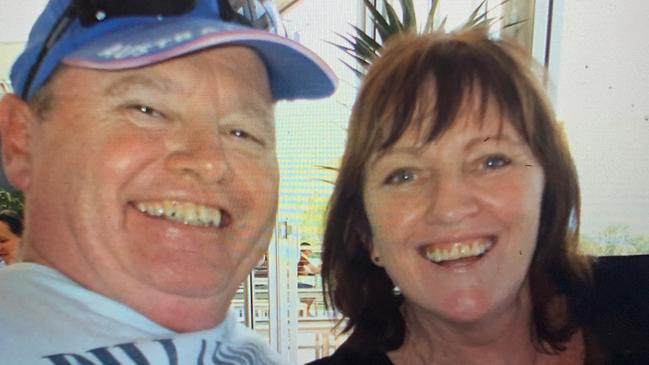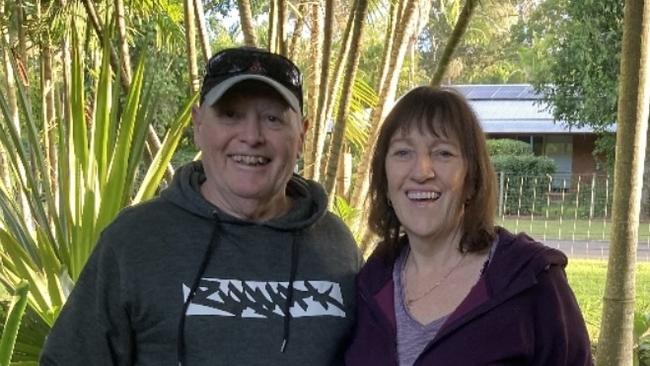Prostate cancer is now Australia’s most common cancer
Breast cancer is no longer Australia’s most common cancer, after a surge in cases pushed a new cancer to the top of the pile. See why experts are concerned.
Health
Don't miss out on the headlines from Health. Followed categories will be added to My News.
Prostate cancer is now the most common cancer in Australia – overtaking breast cancer.
Diagnoses of the cancer are forecast to surge by a massive 34 per cent this year to 24,217 cases after the Australian Institute of Health and Welfare changed the way it calculates its prostate cancer projections.
This compares to 20,640 women diagnosed with breast cancer.
And experts warn clinical guidelines for the cancer are six years out of date and need urgent revision.
The Prostate Cancer Foundation of Australia’s (PCFA) Adjunct Associate Professor Steve Callister said the rate of men now diagnosed with the cancer should be the nation’s biggest “wake up call”.

Professor Callister said the foundation had written to Federal Health Minister Mark Butler asking him to fast-track the foundation’s review of Australia’s current PSA Test.
“The fact is that Australia’s existing guidelines are now six years old and based on outdated data. We hold grave fears that they are putting men’s lives at risk, with 66 men now being diagnosed every day,” Prof Callister said.
“The latest estimates also suggest more than 3,500 men will die from prostate cancer this year, which is a toll we can avoid if the disease is diagnosed early,” he said.
Current guidelines recommend PSA testing should stop once a man turns 70. But the PCFA believes lives could be saved if this was changed and testing offered to those over 70, foundation CEO Anne Savage said.
The guidelines also do not include reference to revolutionary new PSMA PET-CT scans which are 27 per cent more accurate at detecting when the cancer has spread.

The guidelines also recommend men with a family history of the disease have a check up once every two years. Ms Savage said it was time to consider whether annual check-ups are needed.
“Many men are not getting the opportunity to diagnose prostate cancer before it spreads outside the prostate because of these guidelines, and that’s a very serious concern,” Ms Savage said.
She said the wait times were “clearly a sign of a health system facing severe stress”.
“We cannot afford to underestimate the impact this will have on our health services, knowing that prostate cancer accounts for more hospitalisations than any other type of cancer in the country,” she said.
“Investing now in the restoration of services and staff is urgently needed to ensure safe, timely, and effective care. Without immediate action Australia will be confronted by an increase in excess avoidable deaths from prostate cancer.”

In some states, almost one in 10 men are waiting more than a year for a prostatectomy.
Australia wide four per cent of men are now waiting over a year for a prostatectomy up from 0.7 per cent in 2016-17.
MyHospitals website data shows that 50 per cent of men diagnosed with prostate cancer in NSW had to wait more than 10 weeks for surgery and 8.2 per cent wait over a year (up from 1 per cent in 2016-17).
In Victoria four per cent of men wait over a year for a prostatectomy up from 1 per cent in 2016-17
In Queensland 1 per cent of men wait over a year for a prostatectomy, up from zero in 2016-17.
In South Australia only one per cent of men were waiting over a year for a prostatectomy down from 2 per cent in 2016-17.
‘I WAS ANXIOUS AND ANGRY’
Col Gelder had to wait 10 months before starting treatment for his aggressive prostate cancer after the public hospital system lost his test results.
The 65-year-old grandfather of four got so fed up after waiting more than six months for a biopsy, he spent $3,000 to access the diagnostic procedure in the private system.
By the time his cancer was diagnosed it had spread to his lymph nodes and his bones.
Mr Gelder, a retired electrician from Penaraby near Gladstone in Queensland first sought medical attention for the problem in October 2020.

A public hospital urologist ordered an MRI scan and a biopsy of his prostate in January 2021 but the MRI results were never picked up on and the hospital kept delaying his biopsy.
“My biopsy got delayed by six months, six months! So we finally went private to get the biopsy,” Mr Gelder said.
“It came back that I had a Gleason score of nine, aggressive cancer. It had spread to lymph nodes and (a bone in) my hip.
“Any cancer the earlier you get it and the earlier you receive treatment, the better your outcomes,” he said.

While doctors have told him every person is different, the average life expectancy of someone with metastatic prostate cancer is five years.
“The waiting is a killer. I was anxious and angry and should have been on treatment in January,” Me Gelder said.
“You feel just a bit disappointed. It’s so easy to fall through the cracks in the public system”.
Mr Gelder said it was only with the help of a prostate cancer nurse that he finally got access to the medical treatment he needed.
“They’re invaluable because they keep a track on you and they manage it and they make sure that you get your appointments,” he said.
Originally published as Prostate cancer is now Australia’s most common cancer




